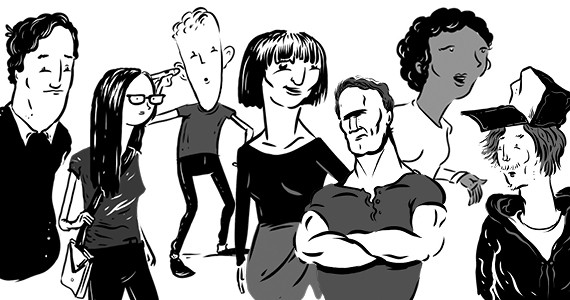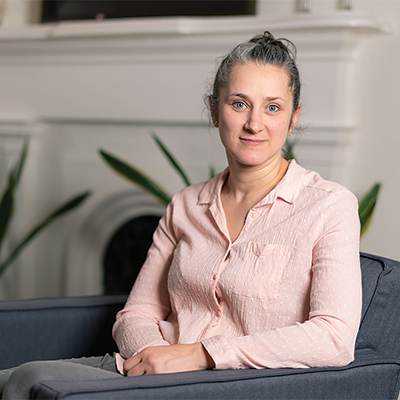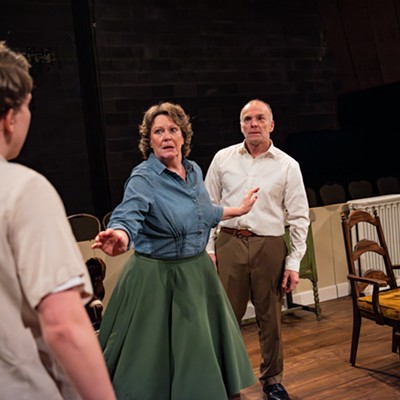SOME YEARS EARLIER:
"It's been theorized that the lonely hearts of our generation find comfort in television," the social worker said. "They develop relationships with the boys and girls parading and fawning over each other on the television screen." Little long-necked and anemia-white Myles steered his bite-sized aerial action figure in front of his face, making whooshing and swooshing sounds, veering it through the blue-white CRT glow as if it were a mountain's profile swathed in fog. Its pulsing blue-white light spotlighted Myles on the mottled orange-brown carpet while Myles' mother and the visitor spoke to one another at the dining room table.
"—parasocial relationships, in which the lonesome beholder"—he gestured towards Myles from the kitchen table, with a sympathetic smile that could collapse and one-eighty itself if comportment weren't of the professional and conciliatory air—"can become very connected to the characters of their favourite television shows. As they feel like they get to know them, as stories progress and they witness them experience certain things, they become drawn in. They begin to feel part of the spectacle. They imagine how they would feel if they were to experience these scenarios themselves, if only they were friends with these actors and actresses. It's a way of staving off feelings of loneliness, either due to low self-esteem or simply isolation,"
Myles was sitting inches from his mother's floor model now in the windowless TV room that fed into the dining room and then the kitchen, with the sort of wide-eyed wonder of a child looking into a cluster of burning white stars.
"And the unique thing is, it can even deflect the feelings of isolation you so worry about with young Myles, dear." The dining room was dim, voices kept to a low volume, a half-eaten bowl of cereal—Myles' dinner—at the seat between Myles' mother and the visitor.
"It isn't such a frightening thing, and for many children it's just a phase. They leave the sedentary life behind as hormones start developing. By the time they have a spurt or get interested in the opposite sex," he said, with positive inflections in his tone and a sympathetic smile. "Before TV people would develop this sense of closeness with politicians, or religious deities, as some still do.
"We're all social animals, see. We crave socialization, contact and comfort. Shut-ins, the elderly, loners, they desire it too. Sometimes, because of past traumas or hang-ups that have yet to be assessed, that sense of belonging and intimacy comes from the television set.
"These daytime programmes Myles seems to be watching, they're dramatizations of interpersonal relationships," he said, dabbing his cigarette into the ashtray. "Episodes regularly feature deceits, love affairs, dire conversations exchanged in whispers, cliff-hangers, large families—dramatizations of the every day, you see."
The phosphor-coated RCA Colortrack that sat on the living room floor fired images at Myles now, as he held his airplane in his lap and sat transfixed by the boys at the cafeteria table, his toes twitching with excitement out from his crossed legs.
"It can be good for developmental growth in adolescents, too, really," he stressed, with consolation in his voice. "During the formative years, where a youth is struggling with their sense of identity, usually unconsciously, youths will identify with certain characters, even just whole archetypal sorts of characters, that embody the characteristics they wish to concretize themselves.
"And with the characters they like and feel they may relate to, or wish to be like in some way, they can have these parasocial—one way—social interactions and enjoy them, because there's not even a risk of rejection among these peers who, both do and do not, exist."
"With these characters they idealize, what they—what little Myles here—likely does with them, is fill in the blank spaces the programme writers and actors leave in the character. I have seen this many times before, and truthfully, I've caught myself doing it watching a night-time programme or two," he laughed to himself. "With the characters he likes, for whatever reason—because of their courageous acts of heroism or masculine features and deep voices perhaps—Myles finishes the job of constructing these sketch-ups to the point where they're incredibly caring and heroic paragons of virtue. It's a common thing."
The conversation went on between Myles' mother and the man in the suit, he expounded more jargon as little Myles became noticeably agitated, his mother remarking that it was nothing, and that Myles usually hates it when the episode ends, or if things don't go well.
"Yes, well," he said, adjusting himself in his chair, "That," he paused, "is something we could perhaps monitor closely then."
The new chapter of Half-heard is published in The Coast—newspaper version—every Thursday. One week later it is published here online. So it's easy to catch up online, but best to stay ahead in print.

















